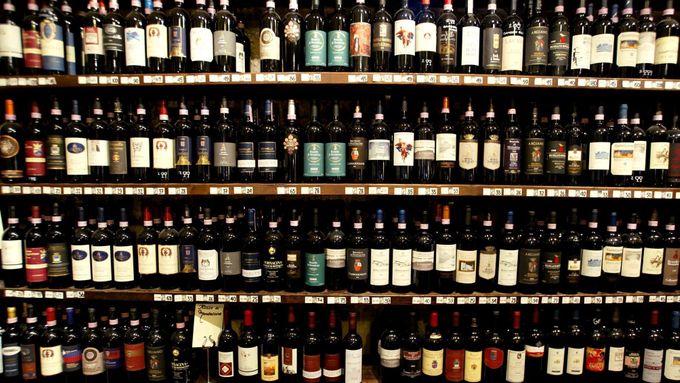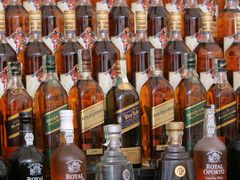Prague - Illicit producers of low-cost alcohol often use commercial disinfectants to „clean" denatured alcohol so it can be used to produce counterfeit alcoholic beverages.
The final products are then sold to cheap market halls, small 24 hours grocery stores, or low-cost discos.
This process is the most primitive level of the huge and complex black market with alcohol that cost the state tens of billions in taxes. Aktuálně.cz has at its disposal a report made by a group of private detectives hired by some of the most important distilleries in the Czech Republic to investigate the scope of the black market with alcohol.
Aktuálně.cz was told by some of those involved in the black market that approximately every second bottle of alcohol sold in the Czech Republic comes from them.
Read more: Exclusive:Gigantic alcohol scam costs Treasury billions
There are three tiers of the black market with alcohol - while the upper two focus on more professional alcohol production and sophisticated tax evasion, the lowest tier producers use untaxed denatured alcohol to produce cheap but extremely dangerous alcoholic beverages.
First, they buy their denatured alcohol cheaply in Poland or from Czech distilleries. Then, they remove the additives, above all extremely bitter bitrex but also other agents added in denatured alcohol in order to make it undrinkable.
„Simply, you use something that can be described as an antidote, most often sodium hypochlorite. It is the chemical agent used to clear water pools. Savo (a popular disinfectant sold in the Czech Republic) can be used too, but it is needlessly expensive," one of the producers said to Aktuálně.cz.
Serious health risk
In one hour, his group is able to clean one thousand liters of denatured alcohol. The „cleaned" product can then be used to produce, for example, 2,500 liters of 40 percent vodka.
There is no doubt among experts that beverages produced in this way constitute a serious health risk for the consumers. „This alcohol is not supposed to get into food chain. Even after it is cleaned, the substance still contains residues of denaturing agents that are several times more dangerous for human organism than ethanol," said Karel Melzoch, the dean of the Faculty of Food and Biochemical Technology, Institute of Chemical Technology in Prague.
For example, the above mentioned bitrex is not eliminated, but only disintegrated into several substances that do not taste bitter, however they stay in the product. These substances can have carcinogenic effects, cause allergic reactions or irreparably damage human internal organs, Melzoch explained.
Division of labor
The production and distribution processes are carefully separated. One group produces alcohol - often, they use old collectivized farm buildings left abandoned in Czech countryside after the end of the communist regime in 1989. Eventually, another organized group distribute the product to low-cost pubs and markets. Both groups work independently, nobody is involved in both production and distribution at the same time. This is done out of security concerns. „If police intervenes, they cut off only one part, which can be quickly replaced," said the man already quoted above.
Pub and market owners that buy illicitly produced alcohol know very well what is going on. The purchases are made with no paperwork, no revenue stamps, and suspiciously cheaply. Although they can be positively sure that what they buy is untaxed illegal alcohol, most often they have no idea who produces it, and where. Everything is very secretive.
Security measures
One of the detectives that conducted the private investigation said that the dealers often use trains or buses to deliver their product, and avoid using cars - all in order to make it harder for police to identify them.
The pub or market owners are given instructions on what to do, what to say and what number to call in case of police inspections. Next day, the dealers provide them with necessary invoices and other documents.
The dealers take advantage of the usual police shift schedule, so the deliveries are often made early in the morning, when one police shift ends and another begins.







